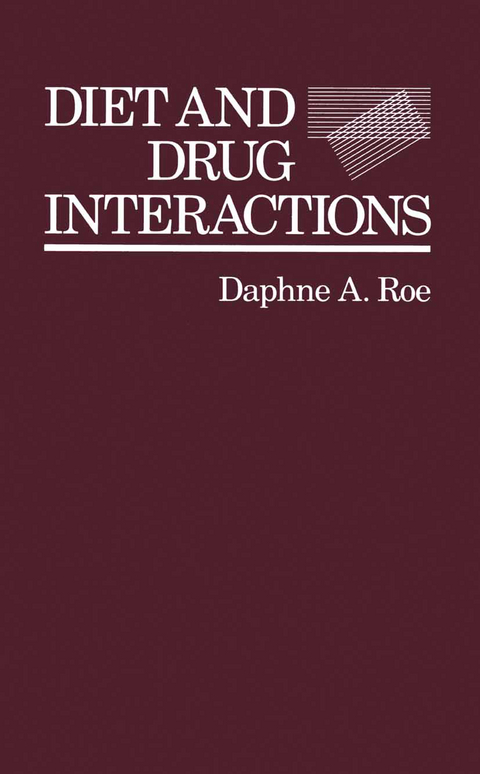
Diet and Drug Interactions
Seiten
2012
|
Softcover reprint of the original 1st ed. 1989
Springer (Verlag)
978-94-011-6049-0 (ISBN)
Springer (Verlag)
978-94-011-6049-0 (ISBN)
When we learn from a patient, clinician, or medical record that a drug has been discontinued, it is logical to ask why. Drugs may also produce nutritional deficiencies, especially in a patient whose diet is marginal in those nutrients depleted by the particular drug.
When we learn from a patient, clinician, or medical record that a drug has been discontinued, it is logical to ask why. The drug may no longer be needed; it may not have produced the desired effect; it may have produced an adverse reaction; a better drug may be available to replace the original drug. The patient may have discontinued the drug because he or she could not see why it was necessary; or the patient may have discontinued the drug because of unpleasant side effects. A drug may not work because its absorption is reduced by physical or chemical interaction with another drug or a food component. It may also not work because the patient's metabolism is speeded up or in hibited to an extent such that the desired duration of drug action is not obtained. Such an effect may be related to a change in diet. Side effects may be related to consumption of specific foods or bev erages or to an overall change in nutritional status. Drug-food and drug-alcohol incompatibility reactions are frequent but are avoidable if a patient is warned of their possible occurrence. Drugs may also produce nutritional deficiencies, especially in a patient whose diet is marginal in those nutrients depleted by the particular drug. Careful prescribing practices together with appropriate nutrient supplements will serve to reduce the risk of these incompatibilities.
When we learn from a patient, clinician, or medical record that a drug has been discontinued, it is logical to ask why. The drug may no longer be needed; it may not have produced the desired effect; it may have produced an adverse reaction; a better drug may be available to replace the original drug. The patient may have discontinued the drug because he or she could not see why it was necessary; or the patient may have discontinued the drug because of unpleasant side effects. A drug may not work because its absorption is reduced by physical or chemical interaction with another drug or a food component. It may also not work because the patient's metabolism is speeded up or in hibited to an extent such that the desired duration of drug action is not obtained. Such an effect may be related to a change in diet. Side effects may be related to consumption of specific foods or bev erages or to an overall change in nutritional status. Drug-food and drug-alcohol incompatibility reactions are frequent but are avoidable if a patient is warned of their possible occurrence. Drugs may also produce nutritional deficiencies, especially in a patient whose diet is marginal in those nutrients depleted by the particular drug. Careful prescribing practices together with appropriate nutrient supplements will serve to reduce the risk of these incompatibilities.
1. Definition, Diagnosis, and Risk of Diet and Drug Interactions.- 2. Effects of Food, Nutrients, and Nutritional Status on Drug Disposition.- 3. Nutrient and Drug-Nutrient Interactions Due to Formula Foods.- 4. Drug-Induced Reactions to Alcohol and Food.- 5. Intolerance to Intentional Additives in Foods and Drugs.- 6. Drug-Induced Nutritional Deficiencies.- 7. Nutrients as Supplements, Drugs, and Nostrums.- 8. Drug Interference with the Biochemical Assessment of Nutritional Status: Analytical and Biological Effects.- 9. Prediction and Prevention of Drug-Nutrient Interactions Using Theoretical Models.- 10. Process Guides for Drug-Nutrient Interactions.- 11. Prescription Guidelines.
| Zusatzinfo | 350 p. |
|---|---|
| Verlagsort | Dordrecht |
| Sprache | englisch |
| Maße | 152 x 229 mm |
| Themenwelt | Medizin / Pharmazie ► Gesundheitsfachberufe ► Diätassistenz / Ernährungsberatung |
| Medizin / Pharmazie ► Medizinische Fachgebiete ► Pharmakologie / Pharmakotherapie | |
| Naturwissenschaften ► Biologie ► Biochemie | |
| ISBN-10 | 94-011-6049-X / 940116049X |
| ISBN-13 | 978-94-011-6049-0 / 9789401160490 |
| Zustand | Neuware |
| Haben Sie eine Frage zum Produkt? |
Mehr entdecken
aus dem Bereich
aus dem Bereich
Indikation, Diagnostik, Therapie
Buch (2024)
Thieme (Verlag)
CHF 109,95
Unter Mitarbeit von Walter Burghardt
Buch | Softcover (2020)
Urban & Fischer in Elsevier (Verlag)
CHF 78,40


